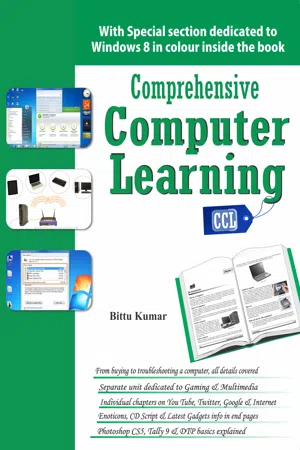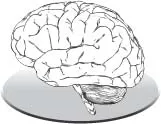
Comprehensive Memory Development Course
What nobody ever told you about memory sharpening methods
- English
- ePUB (mobile friendly)
- Available on iOS & Android
Comprehensive Memory Development Course
What nobody ever told you about memory sharpening methods
About this book
Memory is a fundamental capacity that plays a pivotal role in social, emotional and cognitive functioning. Our memories form the basis for our sense of self, guide our thoughts and decisions, influence our emotional reactions, and allow us to learn. So the ability to form memories and remember them is a vital part of human experience.
Most of us are unaware of the fact that no one is born with a poor memory. It just requires a little sharpening to improve efficiency. Memory is much like a muscle – the more it is used, the sharper it gets, and the more it is neglected, the worse it gets.
Learn how Human Memory System works and how to improve your memory power from Guinness World Record Holder & Qualified International Memory Trainer – Dr. BK Chandra Shekhar, who designed the syllabus (First & Unique in the world) on "Memory Development and Psycho Neurobics" for Government University and Management Training Institutes in India and abroad, with Comprehensive Memory Development Course. This book will help you develop to splendid memory strategies, to organise information efficiently, and to practice the skills necessary for effective learning and recalling of information.
Key Features:
Right Concept of Human Memory System explained
First time in the world, the function of head top computer is explained scientifically
How to increase Concentration – Practical steps explained
How to memorise Numerical Figures, Periodic Tables, Biological terms, Historical dates, Words, Spellings, Name and Faces, Maps and Diagrams, long questions answers of CA, CS and MBA students are explained scientifically with relevant and practical examples.
#v&spublishers
Tools to learn more effectively

Saving Books

Keyword Search

Annotating Text

Listen to it instead
Information
PART: I


Chapter 1
Introduction to Memory
DATA STORAGE OR MEMORY BANK
WHAT IS A MEMORY BANK?
- It is our inner garden: This storehouse is also known as a garden. Soul is the gardener. As the soul plants the seeds of thoughts with the help of an implement known as intellect, in the garden of Subconscious mind, so shall it reap in the future. Imagine your subconscious mind as a bed of rich soil that will help all kinds of seeds to sprout and flourish, whether good or bad. If you sow thorns, you will reap thorny plants and if you sow roses, there will flourish a rose garden. Every thought is cause and every condition is an effect. This is the reason it is so essential that you take charge of your thoughts through enhanced power of third eye. Now begin to sow thoughts of peace, happiness, right action, good will and prosperity. Think quietly and with conviction on these qualities. Continue to plant these wonderful seeds of thought in the garden of your subconscious mind and you will reap a glorious harvest. Once you begin to control your thought processes with the help of your intellect, you can apply the powers, which are hidden in your storehouse to solve any problem or difficulty. If you repeatedly say to your memory bank, “I cannot do it,” your memory will create the same environment in the body and mind and you will feel incapable of doing it.
- It is like Software of Human Computer: Let us understand this with one more example. Your body is like a ship. You are the navigator of the ship. You navigate this ship with the computerised cabin devices. This cabin can be compared to the brain of the body. The software in these computerised devices is known as memory data. As you press the required button, so is the response from these devices, which create conditions for smooth navigation. Similarly, your memory bank receives order from you through conscious mind and intellect and it responds accordingly through physical body for navigating life in the ocean of the world. Be sure, your subconscious mind follows only your orders. If you press the button of fear, worry and anxiety through the thought system of your conscious mind and visualise the same things through your third eye (the Intellect), your subconscious mind or memory banks will act accordingly and will activate fear syndrome in the physical body and the same will be reflected through the face (index of the mind).
- It is the Basis of our Consciousness: Subconscious mind or Impressions (sanskar) is a major manifestation of human consciousness (soul). It can be compared to a receptacle that contains habits, tendencies, personality traits, memories, values, beliefs, learning, talents, instincts, etc. The qualities of activities of the other two manifestations of human soul, i.e. mind and intellect environment are based on the quality of sanskars is the “Sansar” (World) of our inner lives. It gives the soul its specific configuration, just as each compound has a specific chemical configuration, depending on which it reacts.
- It is the Archives of All Previously Recorded Experiences: It is the store of the complete data of the soul's roles in the entire life on this world stage and this is the basis of our individual uniqueness. Impressions (Sanskar), being the receptacle of original attributes, virtues, values and all the experiences, project thoughts, desires or feelings on the mind's screen initiating either positive or negative chain of thought and experience depending on the state of soul-consciousness or body-consciousness respectively. A thought, desire or feeling arises in human mind based on past experiences recorded in memory bank. It Influences our personality. There have been innumerable small and big events in the past, which have exerted their influences on our personality and have molded our characters but which we do not often recognise consciously. Their influences lie in overt or dormant forms. These have become a part of our lives. Our present attitudes, beliefs, fears, prejudices and all that gives us a pattern of unconscious or subconscious behaviour have been formed of these events. The negative experiences of the recent past get projected as negative thoughts, desires or feelings frequently because they are at the top of the Stockpile of experiences in the receptacle of sanskar. Even our obsessions, our temper, our lifestyle is because of these. Some of these memories can perhaps be retrieved under special conditions or with the help of hypnotism or drugs. These implicit or latent memories determine in part what we do and these influence us all the time. It is this kind of memory to which Freud and psychiatrists of his school of thought give a very great significance. Comparing it to a glacier, which has 5/7th of its mass under water; these unconscious memories form a major part of one's personality and a forceful factor that influence its behaviour. These bear heavily on self. All brain-scientists, psychologists and psychiatrists agree that it is this, which gives continuity to one's personality. It is this unconscious memory, which gives a unified character or personality in man's normal state of wakefulness from moment to moment. In Sanskrit language, these dispositions or unconscious memories, which are the result of previous actions, are called impressions (sanskars). It is these, which give unity to the self. The self coordinates the information received from various senses into various parts of the brain and gives to it an experimental unity without which the encoded memory would be meaningless.
BASIC LAWS OF MEMORY
Registration – Retention – Recollection
- Registration: Formation of memory begins with registering the information during perception by sense organs. The data is then filed in a short-term memory system, whic...
Table of contents
- Cover
- Title Page
- Copyright
- Contents
- Dedication
- Publisher’s Note
- Acknowledgements
- Foreword
- Introduction
- PART I: LAWS OF MEMORY
- PART II: APPLICATIONS OF MEMORY: TECHNIQUES
- PART III: PSYCHO NEUROBIC EXERCISES FOR DEVELOPING MIND AND MEMORY POWER
- PART IV: BRAIN MASSAGING TECHNIQUES
- Afterword
Frequently asked questions
- Essential is ideal for learners and professionals who enjoy exploring a wide range of subjects. Access the Essential Library with 800,000+ trusted titles and best-sellers across business, personal growth, and the humanities. Includes unlimited reading time and Standard Read Aloud voice.
- Complete: Perfect for advanced learners and researchers needing full, unrestricted access. Unlock 1.4M+ books across hundreds of subjects, including academic and specialized titles. The Complete Plan also includes advanced features like Premium Read Aloud and Research Assistant.
Please note we cannot support devices running on iOS 13 and Android 7 or earlier. Learn more about using the app